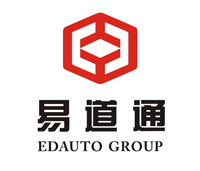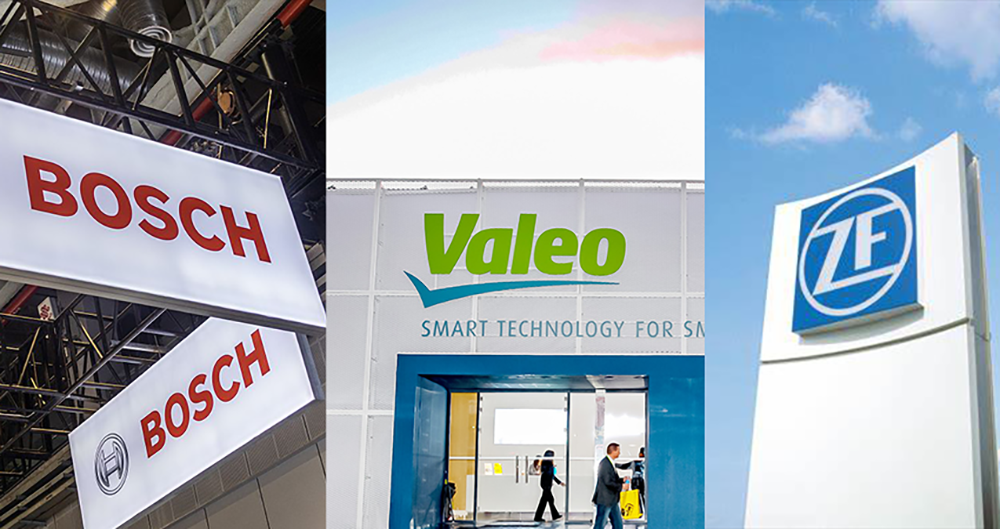
European and American auto suppliers are struggling to turn around.
According to foreign media LaiTimes, today, traditional automotive supplier giant ZF announced 12,000 layoffs!
This plan will be completed before 2030, and some internal employees pointed out that the actual number of layoffs may reach 18,000.
In addition to ZF, two international tier 1 companies, Bosch and Valeo, also announced layoffs in the past two days: Bosch plans to lay off 1,200 people before the end of 2026, and Valeo announced that it will lay off 1,150 people. The wave of layoffs continues to develop, and the cold wind of late winter is blowing towards the automobile industry.
Looking at the reasons for layoffs at these three century-old auto suppliers, they can basically be summed up in three points: economic situation, financial situation, and electrification.
However, the relatively sluggish economic environment does not happen in a day or two, and companies such as Bosch, Valeo, and ZF are in good financial condition, and many companies maintain a steady growth trend and will even exceed expected growth targets. Therefore, this round of layoffs may be roughly attributed to the electric transformation of the automotive industry.
In addition to layoffs, some giants have also made adjustments in organizational structure, business, and product research and development directions. Bosch complies with the trend of "software-defined cars" and integrates its automotive departments to improve customer docking efficiency; Valeo focuses on core areas of electric vehicles such as assisted driving, thermal systems, and motors; ZF is integrating business departments to deal with electric vehicles development needs.
Musk once mentioned that the future of electric vehicles is inevitable and that over time, electric vehicles will gradually replace traditional fuel vehicles. Perhaps these traditional auto parts suppliers are seeking changes in the trend of vehicle electrification to maintain their industry status and future development.
01.European and American giants are laying off workers at the start of the new year, putting great pressure on electrification transformation
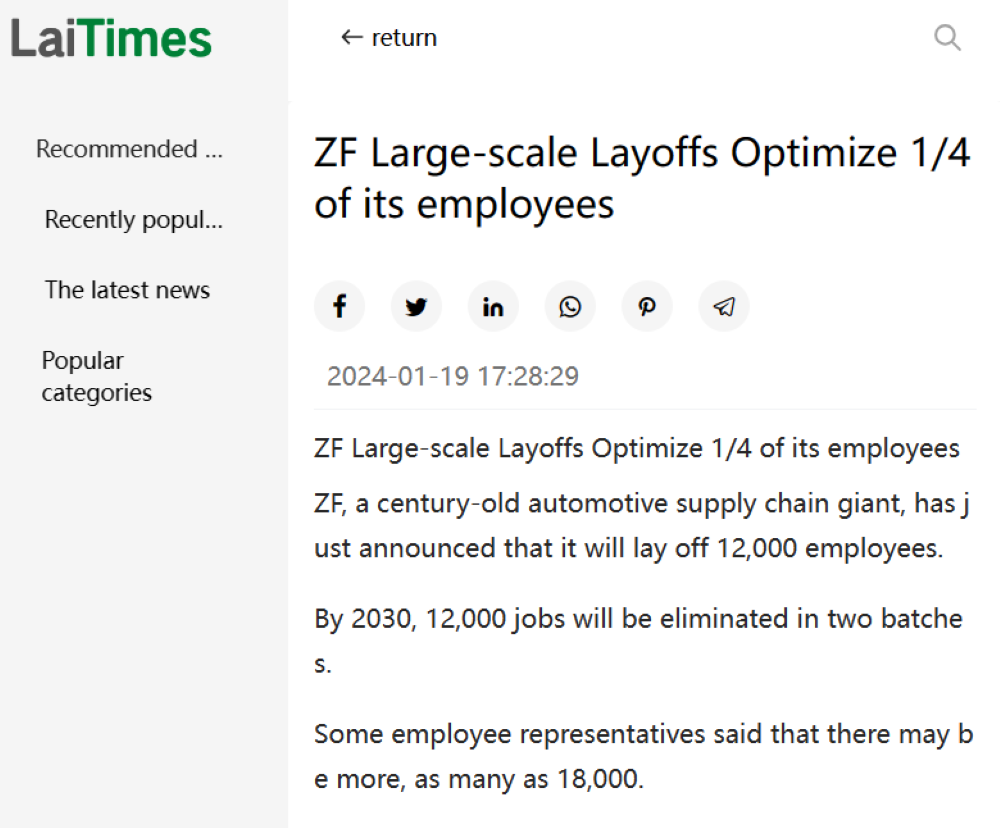
At the beginning of 2024, the three major traditional auto parts suppliers announced layoffs.
On January 19, Bosch said it plans to lay off about 1,200 people in its software and electronics divisions by the end of 2026, of which 950 (about 80%) will be in Germany.
On January 18, Valeo announced that it would lay off 1,150 employees worldwide. The company is merging its hybrid and electric vehicle parts manufacturing divisions. Valeo said: "We hope to strengthen our competitiveness by having a more agile, coherent and complete organization."
On January 19, ZF announced that it expected to lay off 12,000 people in Germany over the next six years, which is equivalent to almost a quarter of all ZF jobs in Germany.
It now appears that layoffs and adjustments by traditional auto parts suppliers may continue, and changes in the automotive industry are developing in depth.
When mentioning the reasons for layoffs and business adjustments, the three companies all mentioned several keywords: economic situation, financial situation, and electrification.
The direct reason for Bosch's layoffs is that the development of fully autonomous driving is slower than expected. The company attributed the layoffs to a weak economy and high inflation. "Economic weakness and high inflation resulting from, inter alia, increased energy and commodity costs are currently slowing down the transition," Bosch said in an official statement.
Currently, there are no public data and reports on the business performance of the Bosch Group's automotive division in 2023. However, its automotive business sales in 2022 will be 52.6 billion euros (approximately RMB 408.7 billion), a year-on-year increase of 16%. However, the profit margin is only the lowest among all businesses, at 3.4%. However, its automotive business has undergone adjustments in 2023, which may bring new growth.
Valeo stated the reason for the layoffs very concisely: to improve the group's competitiveness and efficiency in the context of automobile electrification. Foreign media reported that a spokesperson for Valeo said: "We hope to strengthen our competitiveness by establishing a more flexible, coherent and complete organization."
An article on Valeo's official website shows that the company's sales in the first half of 2023 will reach 11.2 billion euros (approximately RMB 87 billion), a year-on-year increase of 19%, and the operating profit margin will reach 3.2%, which is higher than the same period in 2022. Financial performance in the second half of the year is expected will improve. This layoff may be an early layout and preparation for the electric transformation.
ZF also pointed to the electrification transformation as the reason for the layoffs. A ZF spokesperson said that the company does not want to lay off employees, but the transition to electrification will inevitably involve the elimination of some positions.
The financial report shows that the company achieved sales of 23.3 billion euros (approximately RMB 181.1 billion) in the first half of 2023, an increase of approximately 10% from the sales of 21.2 billion euros (approximately RMB 164.8 billion) in the same period last year. The overall financial expectations are good. However, the company's current main source of income is fuel vehicle-related business. In the context of the transformation of automobiles to electrification, such a business structure may have some hidden dangers.
It can be seen that despite the poor economic environment, the main business of traditional automobile supplier companies is still growing. Auto parts veterans are laying off workers one after another to seek change and embrace the unstoppable wave of electrification in the automotive industry.
02.
Make adjustments to the organization's products and take the initiative to seek change
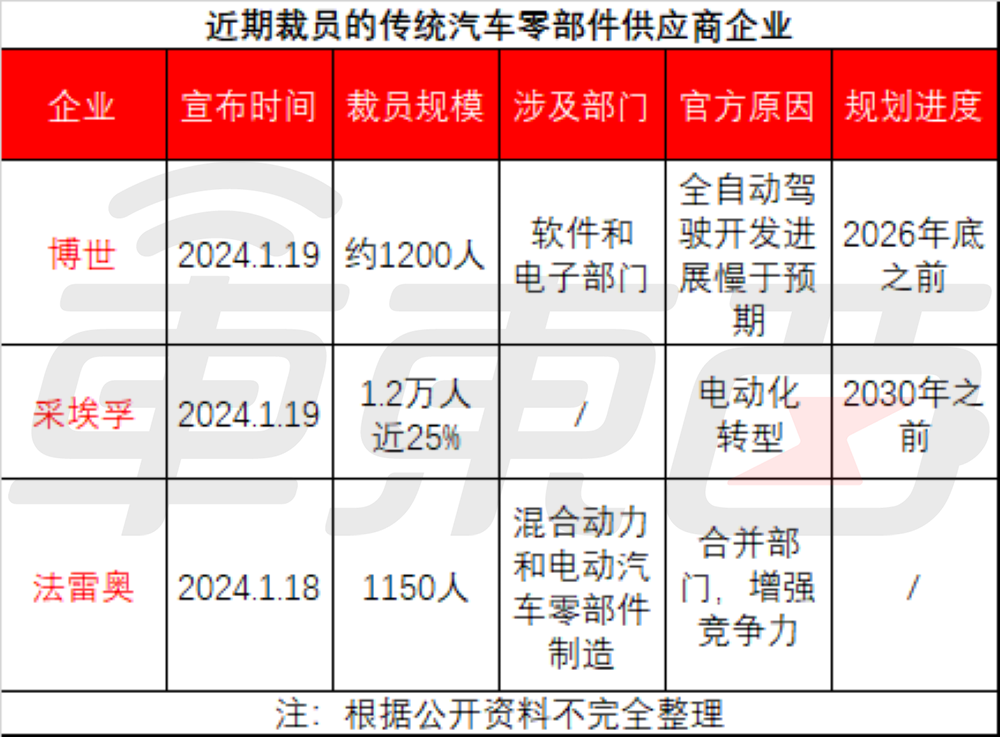
In terms of electrification transformation, several traditional automotive suppliers that laid off employees at the beginning of the year have different views and practices.
Bosch follows the trend of "software-defined cars" and adjusted its automotive business structure in May 2023. Bosch has established a separate Bosch Intelligent Transportation business unit, which has seven business divisions: electric drive systems, vehicle motion intelligent control, power systems, intelligent driving and control, automotive electronics, intelligent transportation after-sales and Bosch automotive maintenance service networks. These seven business units are all assigned horizontal and cross-department responsibilities. That is to say, they will not "beggar their neighbors" due to the division of business scope, but will set up joint project teams at any time based on customer needs.
Previously, Bosch also acquired British autonomous driving startup Five, invested in North American battery factories, expanded European chip production capacity, updated North American automotive business factories, etc., to face the electrification trend.
Valeo pointed out in its 2022-2025 strategic and financial outlook that the automotive industry is facing unprecedented major changes. In order to meet the accelerating industrial change trend, the company announced the launch of the Move Up plan.
Valeo focuses on its four business units: powertrain systems, thermal systems, comfort and driving assistance systems, and visual systems to accelerate the development of the electrification and advanced driving assistance system markets. Valeo plans to increase the number of bicycle equipment safety products in the next four years and achieve total sales of 27.5 billion euros (approximately RMB 213.8 billion) in 2025.
ZF announced in June last year that it would continue to adjust its organizational structure. The passenger car chassis technology and active safety technology divisions would be merged to form a new integrated chassis solutions division. At the same time, the company also launched a 75-kg electric drive system for ultra-compact passenger cars, and developed a thermal management system and a wire control system for electric cars. This also indicates that ZF’s transformation in electrification and intelligent network chassis technology will accelerate.
Overall, almost all traditional auto parts suppliers have made adjustments and upgrades in terms of organizational structure and product definition R&D to cope with the surging trend of vehicle electrification.
03.
Conclusion: The wave of layoffs may continue
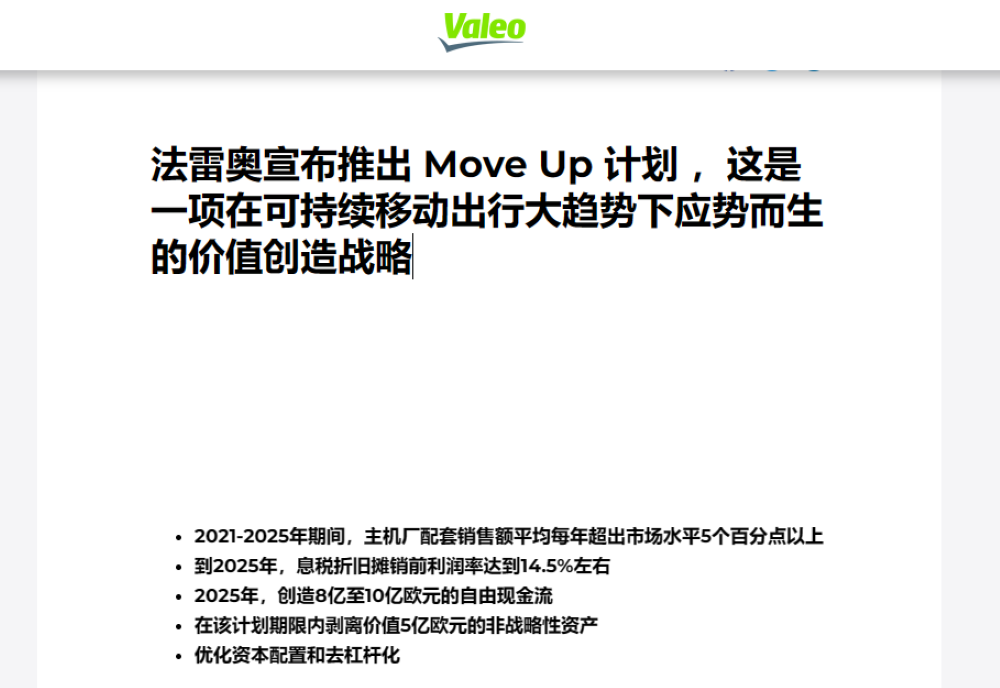
In the wave of electrification in the automotive industry, the market development space of traditional auto parts suppliers has gradually been compressed. In order to seek new growth points and maintain their industry status, giants have embarked on the road of transformation.
And layoffs are one of the most significant and direct ways to reduce costs and increase efficiency. The wave of personnel optimization, organizational adjustments and layoffs caused by this wave of electrification may be far from over.
Post time: Jan-26-2024
